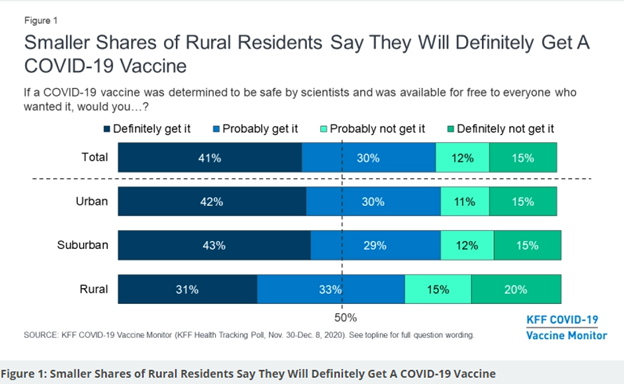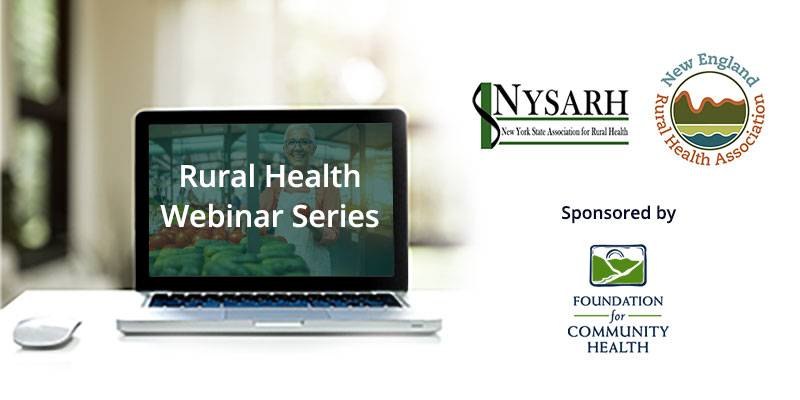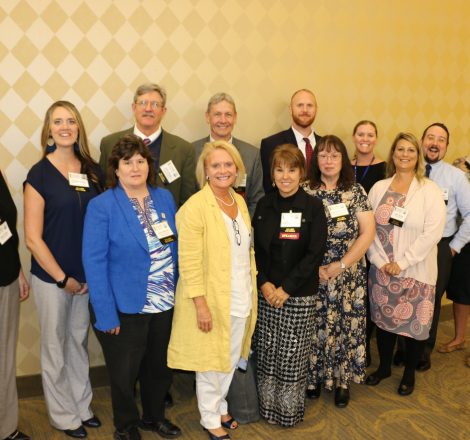NYSARH Newsletter
Spring 2021
Working to preserve and improve health and human services in rural New York State.
April 2021 - June 2021
In this Issue
New York State Budget
Thanks to the federal American Rescue Plan, the New York State enacted budget is largely the opposite of the austerity plan presented back in January. Thanks to the advocacy of NYSARH members and our many partners, key elements of our priorities are included in the new budget.
- Restoration of funding for Rural Health Networks and Rural Health Care Access Hospitals to the SFY21 level of $9,410,000 plus $1,100,000 appropriation;
- Restoration of funding for the Area Health Education Centers to SFY20 level of $2,200,000 after being cut out of the SFY21 budget;
- Funding and regulatory reforms to increase access to Telehealth and Broadband; new $15/month internet plan for low-income families;
- Changes to the 340B Medicaid pharmacy benefit program are delayed to 2023;
- Most public health programs are restored to SFY21 levels; some additional funding for COVID response.
Collaborative Outcomes
The overarching theme of the 2021-2023 Strategic Plan is collaboration. https://nysarh.org/about-us/strategic-plan/
We already have two examples to share.
- NYSARH is partnering with the NYS Public Health Association, NYS Association of County Health Officers and NYS Conference of Environmental Health Directors to host the Public Health Partnership virtual conference.
- NYSARH worked with the NYS Volunteer Ambulance and Rescue Association and the United New York Ambulance Network, Assemblyman Santabarbara and Senator Hinchey to craft legislation to create a Task Force to study the needs of rural EMS A1561B/S3503B. Resources:
New Broadband Benefit
An Emergency Broadband Benefit was approved by the FCC.
About the Emergency Broadband Benefit
The Emergency Broadband Benefit will provide a discount of up to $50 per month towards broadband service for eligible households and up to $75 per month for households on Tribal lands. Eligible households may also receive a one-time discount of up to $100 to purchase a laptop, desktop computer, or tablet from participating providers if they contribute $10-$50 toward the purchase price.
Richard K. Merchant
NYSARH Immediate Past President
How to Maximize Your NYSARH Membership
We are looking for some NYSARH members to join the Education Committee. This committee plans our monthly webinar series https://nysarh.org/webinars/ and other educational opportunities for the benefit of NYSARH members.
NYSARH is seeking volunteers to serve on a new Diversity, Equity & Inclusion Committee. This group will analyze data from the 2020 census to develop strategies based on the current diversity of rural New York.
NYSARH Administered Legislative Appropriation
NYSARH was selected to administer $1.1 million for Rural Health Care Access Development and Rural Health Network Development programs included in the 2019-20 NYS budget.
We are pleased to announce that this project has been successfully completed having overcome several challenges.
A survey of 2019 financials demonstrated that for every $1 of NYS RHN funding, the RHNs were able to secure $2.93 of funding from other sources.
Rural Vaccine Hesitancy
NYSARH received a grant from the National Rural Health Association to address vaccine hesitancy among rural New Yorkers.
Data published by the Kaiser Family Foundation show that 35% of rural Americans say they either will not or probably will not get the vaccine. People living in rural America are no less likely than people in urban or suburban areas to know someone who has tested positive or died from coronavirus, they have other reasons for their hesitancy. Strikingly, 62% of rural residents see getting vaccinated as a personal choice compared with 36% who see it as part of their responsibility to protect the health of others in the community. It is just the opposite for people in urban areas.

NYSARH is developing an interactive webpage on our site. We hope to collect articles, videos and links from our Members to highlight promising practices and trusted messengers.
An official announcement will be made when the Vaccine Hesitancy resource it’s ready.

Upcoming Webinars
Thursday, May 20, 2021
Community Health Worker – Navigator Program
Thursday, June 17, 2021
Domestic Violence & Sex Trafficking for Rural Providers
Participation in the Rural Health Webinar Series is free.
Some events offer CME and NYS Social Work CE credits are available for purchase ($20.00 fee).
VISTA POSITION
COMMUNICATION & DEVELOPMENT SPECIALIST WITH THE NEW YORK STATE ASSOCIATION FOR RURAL HEALTH (VIRTUAL – WORK FROM HOME)
Summer 2021 – Summer 2022
The Communication & Development Specialist (CDS) will be an integral member of the New York State Association for Rural Health (NYSARH) Team. The CDS will focus on expanding the reach and impact of NYSARH communication with a goal of also increasing revenue generated by the organization. All NYSARH activities are nonprofit, bipartisan and courteous. A NYSARH supervisor will be readily accessible to support and mentor the CDS.
Funding Opportunities
CDC funding for COVID-19 to address Health Disparities
The Centers for Disease Control and Prevention (CDC) announced a plan to invest $2.25 billion over two years to address Coronavirus Disease 2019 (COVID-19)-related health disparities and advance health equity among populations that are at high-risk and underserved, including racial and ethnic minority groups and people living in rural areas. CDC’s new National Initiative to Address COVID-19 Health Disparities Among Populations at High-Risk and Underserved Communities, Including Racial and Ethnic Minority Populations and Rural Communities will offer non-competitive grants to state, local, US territorial and freely associated state health departments to improve testing and contact tracing capabilities; develop innovative mitigation and prevention resources and services; improve data collection and reporting; build, leverage, and expand infrastructure support; and mobilize partners and collaborators to advance health equity and address social determinants of health as they relate to COVID-19.
Due April 30, 2021
Telepsychiatry for Skilled Nursing Homes
The Office of Mental Health (OMH) announces the availability of funds for the procurement of contracted mental health service: ECHO (Extension for Community Healthcare Outcomes), telepsychiatry, and teletherapy for skilled nursing facilities (SNF) in New York State that are accepting OMH patients meeting criteria for SNF level of care and are ready for discharge to an SNF.
Due May 10, 2021
MEMBER LIST
We would like to thank each member who works diligently to make NYSARH the state’s strongest proponent for rural healthcare.

Organization-based Members
- Adirondack Health
- Adirondack Health Institute
- Allegany County Department of Health
- Ardent Solutions
- Brooks TLC Hospital System, Inc.
- Canton-Potsdam Hospital
- Catskill Hudson Area Health Education Center
- Cayuga County Community Health Network, Inc.
- Chenango Health Network, Inc.
- Citizen Advocates, Inc.
- Central New York AHEC
- Common Ground Health
- Community Health Center of North Country
- Delaware Co Rural Healthcare Alliance
- Elizabethtown Community Hospital
- Ellenville Regional Hospital
- Finger Lakes Community Health
- Fort Drum Regional Health Planning Organization
- Foundation for Community Health
- Genesee County Health Department
- Healthy Community Alliance, Inc.
- Health Workforce New York
- Hudson Headwaters Health Network
- Hudson River Healthcare
- Ira Davenport Memorial Hospital/Arnot Health
- Jones Memorial Hospital
- Lake Plains Community Care Network
- Le Moyne College
- M.S. Hall & Associates, LLC
- North Country Behavioral Health Network
- Madison County Rural Health Council, Inc.
- North Country Family Health Center, Inc.
- North Country Healthy Heart Network
- North Country Prenatal Council, Inc.
- Oak Orchard Health
- Planned Parenthood of the North Country NY, Inc.
- Prevention Network
- rprt, LLC
- River Hospital, Inc.
- Rural Health Education Network of Schoharie, Ostego and Montgomery Counties
- Rural Health Network of South Central New York
- S2AY Rural Health Network
- Seven Valleys Health Coalition
- Southern Tier Health Care System, Inc.
- Steuben County Rural Health Network
- St. Lawrence County Health Initiative, Inc.
- Sullivan County Public Health Services
- SUNY Upstate Medical University College of Nursing
- The Chautauqua Center
- The Healthcare Consortium
- The Resource Center
- Tioga Opportunities, Inc.
- Tompkins County Human Services Coalition
- Transitional Living Services of Northern New York
- Upper Hudson Planned Parenthood
- Upstate Family Health Center, Inc.
- UR/St. James Hospital
- Wayne County Rural Health Network
- Wyoming County Community Health System
Individual Members
- Ann Abdella
- Diane Albrecht
- Angela Bashaw
- Amy Carman
- Leanna Cleveland
- Alison Coates
- Anthony D’Agostino
- LJ Dimanche
- William Doyle
- Elizabeth Urbanski Farrell
- Danielle Gagne
- Lisa Gugerty
- Beth Harrington
- Richard Kazel
- Andrew Majka
- Rajiv Pant
- Karin Pantel
- Karen Roach
- Carrie Roseamelia
- Susan Salahshor
- Jennifer Seymour
- Jitendra Singh
- James Skiff
- Helen Stepowany
- Kristen Stiegler
- Christine Veschusio
- Julie Vieth
- Sara Wall Bollinger
- Sherry Wyckoff
- David Yens
- Steven Kroll
- Kenneth Morris
Student Members
- Grace Gugerty
- Cara Kowalski
- Janice Shirley
- Matthew Cheevers
Become a Member
We invite you to join us through advocacy and by advancing initiatives that support a commitment to improving healthcare quality and access.
